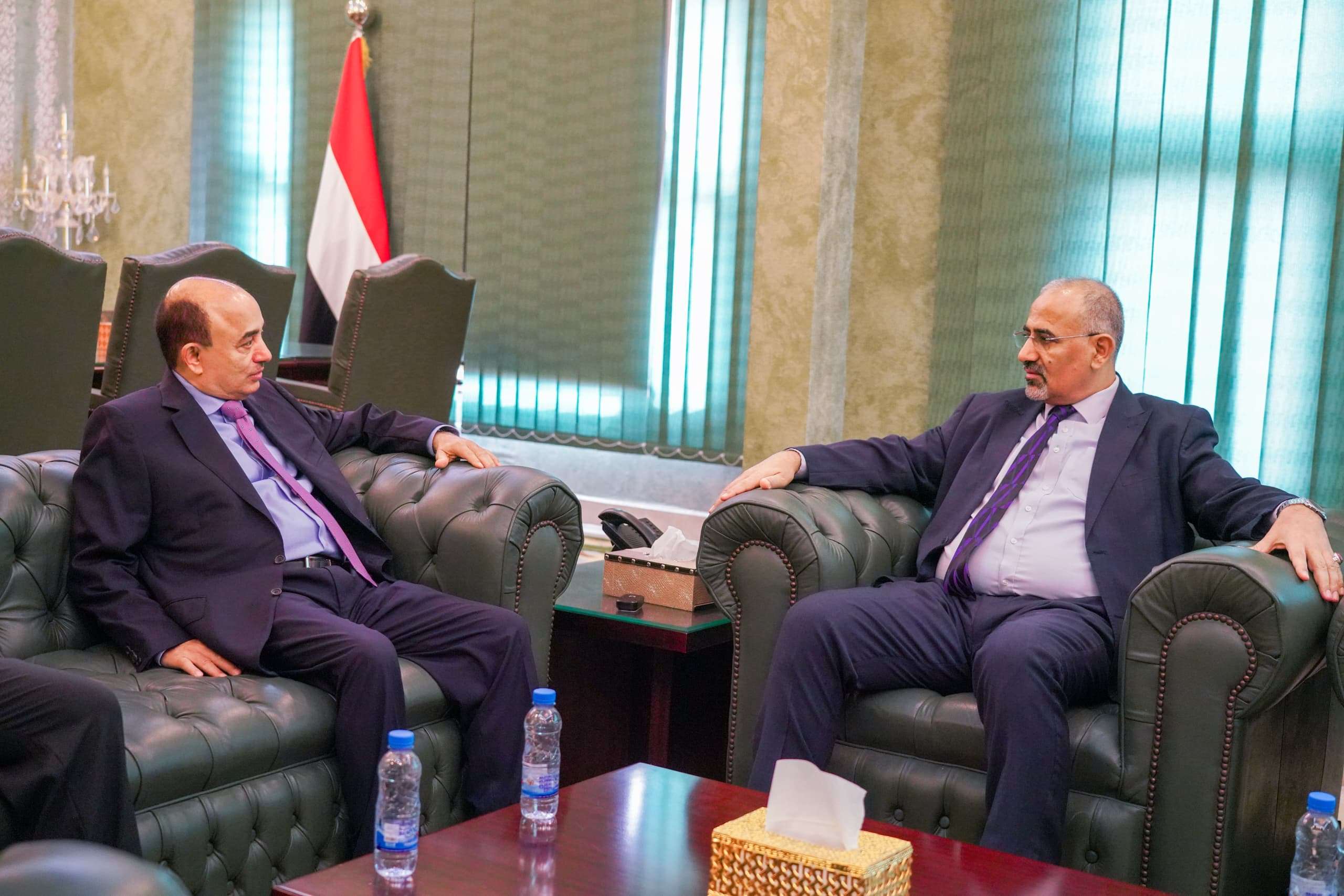
Aidarous Al-Zubaidi meets Rashad Hael Saeed Anam to discuss market stability in Aden – August 4, 2025 (Image: STC Media Office / Getty Images)
Last updated on: 04-08-2025 at 8 PM Aden Time
|
|
Aden (South24 Center)
The internationally recognized Yemeni government has launched a wide-ranging campaign to enforce price reductions on basic goods in South Yemen following a sudden recovery in the Yemeni rial's exchange rate. However, these measures have sparked growing tensions with major private sector actors, who warn of serious consequences if these steps aren't supported by structural guarantees and genuine economic stability.
In Shabwa governorate, local authorities issued a decision on Sunday, August 3, to shut down several major companies, including the Hayel Saeed Anam Group, Al-Mahdar Company, and Al-Naqeeb Company, for refusing to adjust prices in line with the improved exchange rate. The U.S. dollar traded at approximately 1,617 rials for buying and 1,632 rials for selling that same day, a significant improvement after having neared the 3,000-rial mark during the currency's worst decline.
This came after the Hayel Saeed Anam Group issued a strongly worded statement refusing to comply with government and public demands for price reductions matching the currency's improvement. The group explained that ongoing exchange rate fluctuations and lack of official guarantees prevent alignment with the Industry and Trade Ministry's pricing directives, though it promised reductions according to its own plans.
The group directly criticized Aden's Central Bank, accusing it of imposing an unrealistic exchange rate that doesn't reflect market realities, noting most importers obtained foreign currency at high rates through either the bank's auctions or local markets. It warned that any ill-considered intervention could lead to a wave of bankruptcies and worsen market instability.
In an escalating move, Al-Dhalea police issued a decision on Monday, August 4, banning the entry and distribution of Hayel Saeed Anam Group products within the governorate, blocking their transit along the Aden-Al-Dhalea-Sana'a international highway as punitive pressure to force price reductions.
On the same day, Aidrous Al-Zubaidi, Vice President of the Presidential Leadership Council and head of the Southern Transitional Council, met with Rashad Hayel Saeed Anam, the group's deputy chairman, to discuss its efforts to secure basic food supplies for local markets amid Yemen's ongoing economic crisis.
Fuel prices showed uneven declines across governorates. In Hadramout, petrol prices dropped from 1,820 to 1,550 rials per liter, while in Aden they fell from 1,850 to 1,550 rials. In Shabwa, diesel reached 1,640 rials, while Al-Mahra recorded the country's lowest price at 1,425 rials per liter.
Market responses varied. According to field monitoring by ‘South24 Center’ in Hadramout, a 20kg bag of premium Rice dropped from 75,000 to 35,000 rials, frozen chicken (1.2kg) fell from 8,500 to about 4,700 rials, and a 30-egg tray decreased from 8,000 to around 4,000 rials.
Authorities in Aden and other governorates continue ongoing inspection campaigns of commercial outlets to monitor price reductions.
On Sunday, August 3, the Central Bank announced penalties against six exchange companies, revoking or suspending licenses for violations, bringing the total to nearly 40 exchange firms penalized within two weeks.
The Yemeni Central Bank also issued a new circular to all operating banks in the country tightening controls on foreign currency transfers and sales for personal purposes. The official circular mandated banks to strictly adhere to a $2,000 ceiling for personal transfers, including tuition and medical expenses, while requiring verification of submitted documents before approving any currency exchange or transfer.
Required documents include copies of passports, visas or security permits, travel tickets, and academic or medical reports. The circular emphasized that any violations would face immediate legal measures.
Despite these developments, business and economic circles remain broadly skeptical. Many traders believe this temporary exchange rate improvement, without accompanying financial and structural reforms, could produce counterproductive results.
Meanwhile, waves of public anger continue rising across South Yemeni governorates, particularly in Hadramout, with protests against deteriorating living conditions, high prices, and eroding confidence in the government's ability to fulfill its promises.
Economic concerns have recently intensified after the Iran-backed Houthis announced in July the issuance of a new 200-rial banknote through Sana'a's Central Bank, along with a 50-rial coin, under the pretext of replacing damaged currency, a move that has sparked debate about its implications for monetary stability.
Previous article